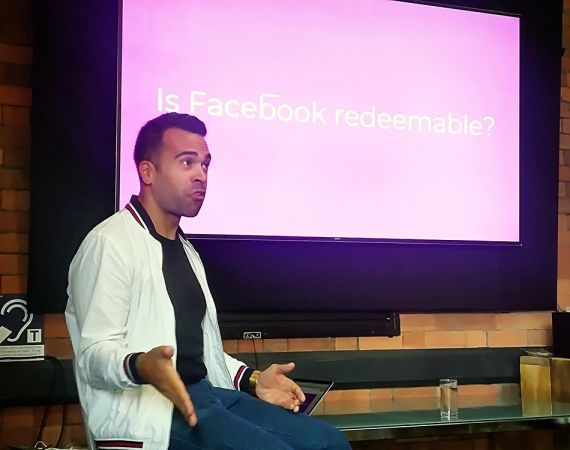Lunchtime talk write-up
Posted on Thu 16 Aug 2018
Facebook for Sceptics
Marcus Gilroy Ware is a lecturer of Journalism at UWE, has published a book on social media called Filling the Void: Social Media and The Continuation of Capitalism and has been a Studio resident for the past two years. Tim Kindberg is a Studio resident, computer engineer and develops software, but…

Posted by
Speaker
Marcus Gilroy Ware is a lecturer of Journalism at UWE, has published a book on social media called Filling the Void: Social Media and The Continuation of Capitalism and has been a Studio resident for the past two years. Tim Kindberg is a Studio resident, computer engineer and develops software, but is also interested in the impact of social media and the demystification of tech. Together they combined their expertise to bring us Facebook for Sceptics.
Five Things I Learned:
1. You may be surprised to learn that Facebook’s empire includes social media giants such as WhatsApp, Instagram and Oculus. Despite Facebook having a lack of network around the world, they recently have abandoned plans to grow it, instead focusing on how to utilise the data they already get from us. Facebook has data on us including our names, age, what we look like, our hometown and phone number – all of which we willingly give them. But they also gather information about our likes, geolocations, mouse/headset movements.
2. Information from our videos, posts, messages and even hidden metadata from calls and texts can be used to infer attributes including people’s sexual orientation and social class. They inference that you are gay or from a certain social class is run through statistical algorithm, which are prone to being wrong. Facebook make 40-billion-dollar revenue, not through selling data, but for giving access to sellers to push targeted advertising. Companies pay huge amounts of money to reach very specific age ranges and demographics.
3. More increasingly, we’ve seen examples of this applying to political campaigns. The recent Facebook data scandal involving British political consulting company Cambridge Analytica used a personality quiz called Thisisyourdigitallife to harvest masses of data from users who agreed to the terms of the app and even the data of the user’s network of friends. Our personal data has become a new kind of raw material for capitalism to make profit – credit agencies have been doing this for decades, but nothing of this magnitude. There is lots of algorithmic manipulation that decides what appears in the time feed.
4. Marcus states that there are few generalisations you can make for humanity, but one of them is that we are all social beings. Does social media foster our sociality or do we use this platform as a cheap and convenient means of communication? Sociality is linked with mental health and growing body of research shows that a lack of social interaction correlates to feelings of anxiety and depression and rather unfortunately those who are depressed often turn to social media for comfort.
5. You are the product – nothing really is for free, but in a way, this has been true for many decades. There are no hard facts proving that social media can manipulate polls and voting, however that doesn’t mean we shouldn’t be concerned. Is Facebook redeemable? It’s a resounding no from Marcus and Tim. Do we automatically assume that there an equal benefit to both parties or are Facebook getting the bigger benefit? Tim believes we should all invoice Facebook for our time spent on it.

